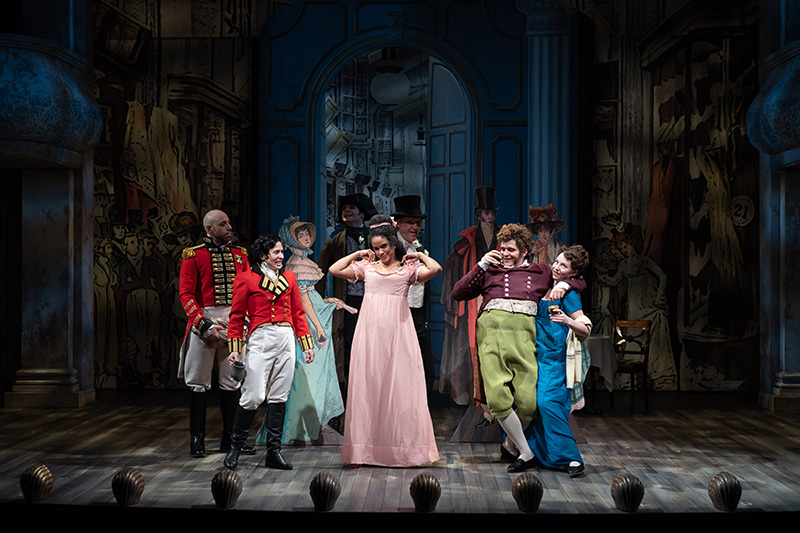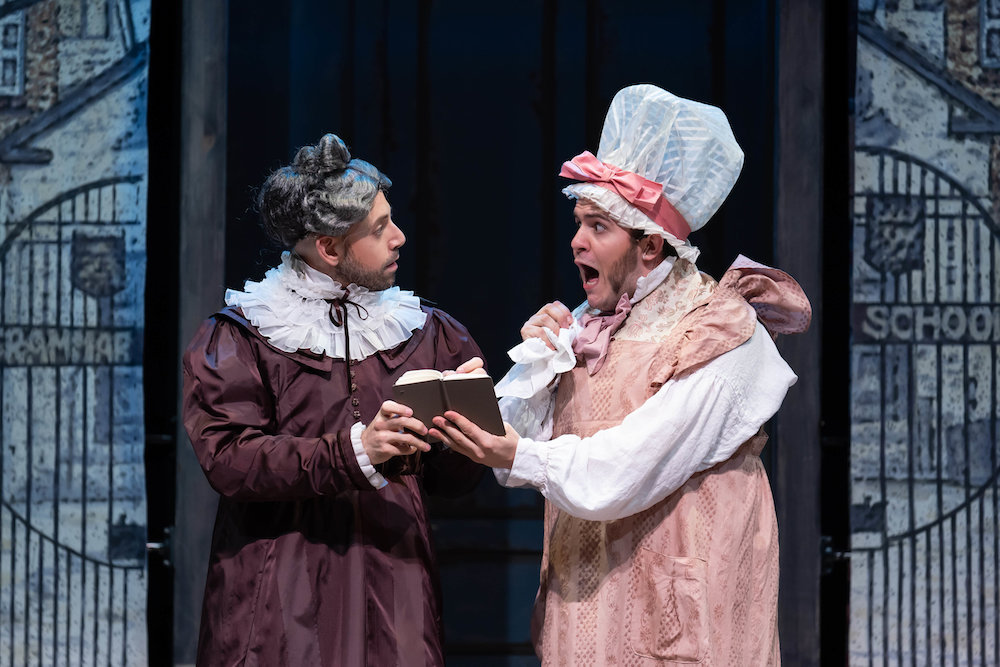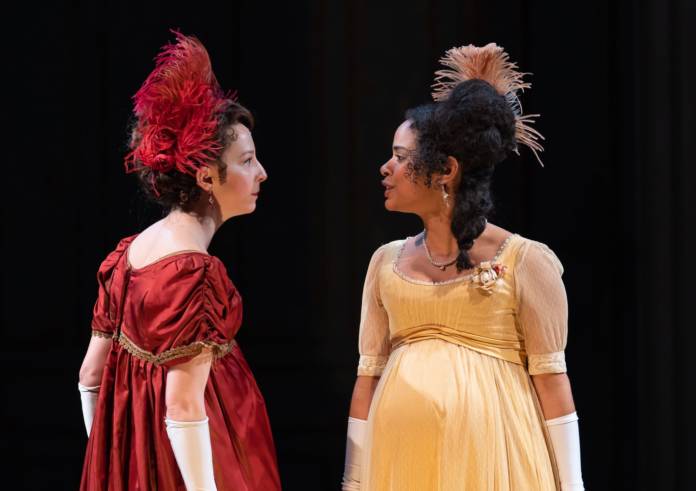ONSTAGE If you disregard the period setting, squint at the pastel backdrops and blur out the sumptuous jewel-toned dresses, Kate Hamill’s adaptation of Vanity Fair (at ACT through May 12) excavates the psychic blueprint of a different production — Kander and Ebb’s Cabaret.
An emcee in the guise of a Manager (Dan Hiatt) guides the audience through most scenes while wryly commenting upon the action. He leads the cast in an acerbic opening ditty that sets the tone for several other short songs interspersed throughout. As an analog to the two World Wars in Cabaret, the Napoleonic Wars stop and then start up again, always offstage, but influencing the louche, dissolute society in which the characters inhabit. But it’s in the playwright’s reinvention of William Thackeray’s Becky Sharp, his novel’s protagonist and protofeminist, where the comparison really finds traction.
Hamill presents the audience with a vision of how Sally Bowles becomes Sally Bowles. When Cabaret begins, she’s already a “fallen woman,” and one who wants to stay fallen. Because, for the moment, she’s enjoying herself—but she also senses that there’s no point in getting up. Yet who was she before we meet first meet her? A likely candidate is Vanity Fair‘s impoverished orphan Becky Sharp (Rebekah Brockman), who wants to rise and transcend her penniless circumstances. Can she will herself to do so? The answer is both yes and no, with the no feeling ultimately truer. Brockman draws out what’s contemporary in the script to form Becky’s character—she’s smart and ambitious—without letting us forget why she must be so conniving. The actress lets us see that Becky is not amoral for the sake of it. She’s amoral because she’s trying to survive in a caste system that’s governed by men.

Thackeray provided her with a mirror in her schoolmate Amelia Sedley (Maribel Martinez), who’s called Emmy. She’s her tonal opposite, a sheltered innocent who comes from a tonier class. George (Alyssa Wilmoth Keegan), her betrothed and a bit of a bounder, is also wealthy and an officer in the army. Emmy’s path in life is clearly prescribed. She’ll leave her father’s estate to marry George and they’ll live happily ever after with all their land and money held intact by their union, while the low-born Becky earns her keep as a governess. But fate, via authorial intent, intervenes. Vanity Fair tracks the rise and fall (and inevitable second rise) of both women.
In this production, five actors play a multitude of supporting roles. This approach lends the play an economy and adds a welcome briskness to the pace. Only Brockman and Martinez are excluded from all the sudden costume changes and shapeshifting that takes place. And nearly everyone gets the chance to do some gender-bending. Vincent Randazzo is fearsome as Sir Pitt, feckless as Emmy’s brother Jos Sedley and, as Miss Jemima, weepy as a bonnet-wearing nelly. Wilmoth Keegan, sporting a fine pair of bushy sideburns as George, also makes for a convincing old biddy as Miss Briggs. Sometimes the costume changes happen in front of us. Or, in one clever costume design, an actor’s dress hangs on his front while he’s still wearing pants underneath.

Under Jessica Stone’s direction, the silliness has plenty of room to land but she doesn’t linger on it. The jokes keep moving right along. What works especially well about these farcical elements is that they’re intimately tied to the more serious aspects of Becky’s and Emmy’s fates. We can laugh ruefully at the absurdity of the class system and then lament the fact that both women can lose their place in society so easily. We root for them because they make such ruinous personal decisions. Emmy pursues a sad path towards self-abnegation just as Becky overcompensates for her lack of status with a bout of hubris. A century and a half after publication, her confident overreach makes Becky Sharp a relevant, compelling character.
VANITY FAIR
Through May 12
ACT, SF.
Tickets and more info here.




